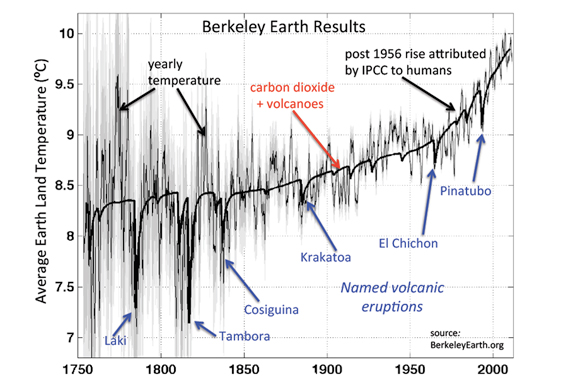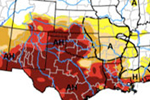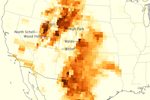
Berkeley Earth Project temperature graph going back to 1750, shows how volcanic eruptions lower temperatures in the short-term. Image courtesy of Berkeley Earth Project.
After starting his own project to study global warming, a once-prominent climate change skeptic and physicist says he now accepts the reality of anthropogenic climate change.
“Last year, following an intensive research effort involving a dozen scientists, I concluded that global warming was real and that the prior estimates of the rate of warming were correct. I’m now going a step further: Humans are almost entirely the cause,” Richard Muller writes in the New York Times as his team, the Berkeley Earth Project, releases a new paper that finds an even stronger link between greenhouse gas emissions and rising temperatures worldwide than the Intergovernmental Panel on Climate Change (IPCC).
According to the paper, which hasn’t been peer-reviewed yet, global land temperatures have increased 0.83 degrees Celsius (1.5 degrees Fahrenheit) in the last 250 years. The team further found solar activity had a negligible impact on global temperatures, but influxes of carbon into the atmosphere explained temperature changes precisely.
“I was not expecting this, but as a scientist, I feel it is my duty to let the evidence change my mind,” Muller says in a press release, adding that,
“To be considered seriously, any alternative explanation must match the data at least as well as does carbon dioxide.”
To date, numerous alternate explanations for current climate change have been tried and tossed out, leaving carbon dioxide as the decisive cause. Human emit carbon largely by burning fossil fuels for energy—such as coal, oil, and natural gas—but also through deforestation, land use changes, and industrial agriculture.
The Muller team also found that volcanic eruptions explained sudden dips in the temperature record. By spewing light-reflecting particles into the atmosphere, volcanoes are capable of briefly cooling the Earth.
“I am glad that Muller et al have taken a look at the data and have come to essentially the same conclusion that nearly everyone else had come to more than a decade ago,” climatologist Ken Calderia at Stanford told Climate Progress. “The basic scientific results have been established for a long time now, so I do not see the results of Muller et al as being scientifically important. However, their result may be politically important. It shows that even people who suspect climate scientists of being charlatans, when they take a hard look at the data, see that the climate scientists have been right all along.”
Climatologists have long been making the case that the world needs to rapidly cut greenhouse gas emissions in order to stave off catastrophic climate change, yet emissions continue to rise and carbon dioxide concentrations in the atmosphere hit 400 parts per million (ppm) for the first time in the Northern Hemisphere this year.
For his part Muller says the debate over climate change needs to move from questioning the science to deciding how to proceed.
“I hope that the Berkeley Earth analysis will help settle the scientific debate regarding global warming and its human causes,” he writes in the New York Times. “Then comes the difficult part: agreeing across the political and diplomatic spectrum about what can and should be done.”
Related articles
Climate change increased the probability of Texas drought, African famine, and other extreme weather

(07/11/2012) Climate change is here and its increasing the chances for crazy weather, according to scientists. A prestigious group of climatologists have released a landmark report that makes the dramatic point that climate change is impacting our weather systems—and in turn our food crops, our economies, and even our lives—here-and-now. The new report in the American Meteorological Society is first of what is intended to be an annual offering that will attempt to tease out the connections between climate change and individual extreme weather events, such as heatwaves, droughts and floods.
Drought, heat, fires push more Americans to accept reality of climate change
(07/19/2012) Record temperatures, wildfires, drought, and crop failures have is helping convince more Americans that climate change is real and occurring, reports Bloomberg.
Scientists: iron fertilization could be a big climate help
(07/18/2012) For a long time, oceanic iron fertilization was seen as a promising mechanism to combat global climate change. But then in 2009 a well-publicized study found that iron fertilization stored 80 times less carbon than expected, dampening enthusiasm and support around the geoengineering scheme. Now, however, the idea of fertilizing the ocean with iron may be back: a new study in Nature reports that iron fertilization, in the right conditions, could store carbon in the deep ocean for centuries.
Northern Hemisphere experiences warmest June on record
(07/17/2012) The Northern Hemisphere suffered its warmest June on record across land and sea, while globally it was the fourth warmest June yet, according to new data from the National Oceanic and Atmospheric Administration (NOAA).
Republican stalwart calls global warming ‘a matter of fact’, pushes for carbon tax
(07/13/2012) Former Secretary of State George Shultz is calling for a carbon tax to reduce U.S. greenhouse gas emissions and oil consumption, according to an interview released today by Stanford University.
Deja vu: U.S. undergoes hottest 12 months on record…again and again
(07/12/2012) According to new data from the National Oceanic and Atmospheric Administration (NOAA)’s National Climatic Data Center, the last twelve months have been the warmest on record for the contiguous United States. This record, set between July 2011 through June 2012, beat the last consecutive twelve month record set only a month earlier between June 2011 and May 2012, which in turn beat the previous record holder, you guessed it: May 2011 through April 2012.
As U.S. sees record heat, extreme weather pummels 4 continents

(07/10/2012) It’s not only the U.S. that has experienced record-breaking extreme weather events recently, in the last couple months extreme weather has struck around the world with startling ferocity. In addition to the much-covered heatwaves, wildfires, and droughts in the U.S., killer floods struck India, the worst drought yet recorded plagued South Korea, and massive forest fires swept through Siberia to name just a few.
Pre-industrial deforestation still warming atmosphere
(07/03/2012) Fossil fuels were not burned in massive quantities prior to the Industrial Revolution, but humans were still pumping carbon into the atmosphere due to land use change, especially deforestation. In fact, a new study in Environmental Research Letters finds that deforestation prior to 1850 is still heating up our atmosphere today.
Scientist: ‘no doubt’ that climate change is playing a role in U.S. fires

(07/02/2012) A noted climate scientist says there is ‘no doubt’ that climate change is ‘playing a role’ in this year’s series of record fires in the western U.S. A massive wildfire in Colorado has forced the evacuation of 36,000 people, destroyed over 300 homes, and killed two people. The devastation wrought by the Waldo Canyon Fire even prompted a visit form U.S. President Barack Obama. But this is not the only epic fire in the U.S. this year: less than a month before the Colorado disaster, New Mexico experienced its largest fire on record in Gila Nation Forest; the conflagration burned up 247,000 acres (100,000 hectares). Other major wildfires have occurred in Utah and Wyoming, as well as other parts of New Mexico and Colorado.
Scientists give world leaders ‘Fs’ on climate change, biodiversity, and desertification

(06/19/2012) It seems world leaders may need to retake environmental studies. As the Rio+20 Summit on Sustainable Development opens, the scientific journal, Nature, has evaluated the progress made on three treaties signed at the Rio Earth Summit in 1992: climate change, biodiversity decline, and desertification. Unfortunately the publication gives progress on all three treaties an ‘F’, highlighting how little progress has been made on the global environmental crisis.
Scientists: if we don’t act now we’re screwed

(06/07/2012) Scientists warn that the Earth may be reaching a planetary tipping point due to a unsustainable human pressures, while the UN releases a new report that finds global society has made significant progress on only four environmental issues out of ninety in the last twenty years. Climate change, overpopulation, overconsumption, and ecosystem destruction could lead to a tipping point that causes planetary collapse, according to a new paper in Nature by 22 scientists. The collapse may lead to a new planetary state that scientists say will be far harsher for human well-being, let alone survival.